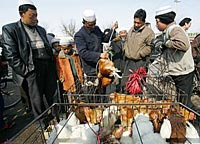




HONG KONG—China has rushed 3 million doses of bird flu vaccine to the Western province of Qinghai and said all livestock birds must be inoculated, as the World Health Organization (WHO) called for stepped-up surveillance of the deadly virus.
Some 178 bar-headed geese found in a nature reserve in Qinghai, which has a substantial Tibetan population, were the first cases of bird flu China has reported since July 2004.
The first 150 dead birds were found on May 4-6, and the other 28 on May 8, the official China Daily newspaper said.
Experts fear the birds, which cross the country on routes from Siberia to New Zealand, could spread the virus to the China's vast population of domesticated ducks and geese.
The number of doses matched the poultry population in the province, the China Daily quoted an official from the Ministry of Agriculture’s animal diseases office as saying.
Agriculture officials confirmed that the dead birds carried the H5N1 bird flu strain from Southeast Asia—a more deadly variety of bird flu that may contain a gene allowing transmission to humans.
The H5N1 strain of bird flu has been confirmed in eight South East Asian countries since 2003—including Vietnam and Cambodia.
Last week, WHO said bird flu may be capable of human-to-human transmission, raising fears of a global pandemic.
The WHO meanwhile urged Asia countries to step up surveillance of the virus. “There is still the possibility for this to jump to humans,” WHO spokeswoman Maria Cheng said in Beijing.
The WHO has said bird flu poses a threat to humans if it develops the ability to spread from person to person. So far most cases in humans have been traced to contact with sick birds.
Worried about the disease's spread, Malaysia on Monday said it was banning all imports of chicken and meat products from China.
In Hanoi, Vietnam reported Monday that another person died from bird flu, bringing the regional death toll to 54 as the communist country continues to fight the disease.
Vietnam has started but has yet to complete developing the bird flu vaccine. It targets to test the vaccine on humans in August while initial tests on poultry showed the birds have shown anti-bodies.
A 46-year-old man from the northern province of Hung Yen died May 19 at Bach Mai Hospital in Hanoi after being admitted three days earlier with classic bird flu symptoms that included a high fever, coughing and breathing problems, said Phan Tien Son, director of the Hung Yen provincial preventive medicine center.
The man tested positive for the H5N1 virus on May 18 while he was hooked to a respirator, he said.
It was unclear how the victim became infected. No bird flu outbreaks had been reported among poultry in the man's village and he had not traveled outside the area, but the family did raise ducks, Son said.
None of the poultry appeared sick and the man did not eat duck, he added.